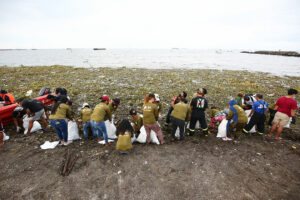




January Economic Update: Growth slows, prices rise
 DOWNLOAD
DOWNLOAD

Inflation Update: Up, up, and away?
 DOWNLOAD
DOWNLOAD

Quarterly Economic Growth Release: Growth takes on a slower pace
 DOWNLOAD
DOWNLOAD


PHL eyes USD 600-M World Bank loan

THE MARCOS administration is seeking a USD 600-million loan from the World Bank to help the Philippines bounce back from the pandemic, as well as improve climate resilience and fiscal management.
The Philippines’ first sustainable recovery development policy loan (DPL) is expected to be approved by the World Bank board on May 16, 2023, according to a document uploaded on the multilateral lender’s website.
“The DPL series aims to support the government of the Philippines’ reforms to: 1) accelerate the economic recovery; 2) protect the environment and improve climate resilience; and 3) improve fiscal management,” the World Bank said.
The Washington-based multilateral bank said the reforms supported by the proposed loan series will be implemented by the Marcos administration “which has thus far emphasized some degree of economic policy continuity.”
The loan series is expected to boost foreign investments in renewable energy, green sectors and shipping service infrastructure, as well as increase the number of public-private partnership (PPP) projects.
It will also support reforms to protect the environment and improve climate resilience through plastic waste reduction, recovery and recycling, and the increased use of green public procurement.
The loan series is also expected to improve fiscal management through reforms that will boost revenues, contain expenditures and reduce fiscal risks from the agriculture sector.
“The reforms supported by this DPL series are well aligned with the forthcoming 2023-2028 Philippine Development Plan and AmBisyon Natin 2040, in particular, the objectives to protect the purchasing power of families through reduced energy costs; to create more jobs through promoting investment, improving infrastructure, and achieving energy security; to create green jobs through pursuing a green and blue economy; and to ensure sound macroeconomic fundamentals,” the World Bank said.
The World Bank said the loan is also aligned with its 2019-2023 Country Partnership Framework for the Philippines, and its goals of ending poverty and promoting shared prosperity.
The implementing agencies for the loan series include the departments of Energy, Trade, Budget and Environment, as well as the Anti-Red Tape Authority, Office of the President, Bureau of Internal Revenue, and National Economic and Development Authority (NEDA).
Development policy loans typically support policy and institutional changes needed to create an environment conducive to sustained and equitable growth as defined by borrower countries’ own development agenda, according to the World Bank.
As of 2021, the World Bank was the country’s third-largest source of official development assistance (ODA), with loans and grants representing 24% of the total, based on a report from the NEDA.
The World Bank is currently supporting 25 ongoing programs and eight grants worth USD 7.66 billion as of 2021. Out of the 92 new ODA last year, 44% were from the World Bank, or USD 2.9 billion for seven loans and two grants.
The National Government’s (NG) debt ballooned in 2020 and 2021 as the government ramped up borrowings to fund its coronavirus response and stimulus measures.
As of end-October, the NG debt hit a record high of PHP 13.64 trillion, of which 69% were from domestic sources.
Outstanding debt as a share of GDP rose to 63.7% as of the third quarter, the highest in 17 years. This is above the 60% threshold considered manageable by multilateral lenders for developing economies.
The government is aiming to bring down the debt-to-GDP ratio to 61.8% by yearend and 52.5% by 2028. — Keisha B. Ta-asan
This article originally appeared on bworldonline.com





 By BusinessWorld
By BusinessWorld